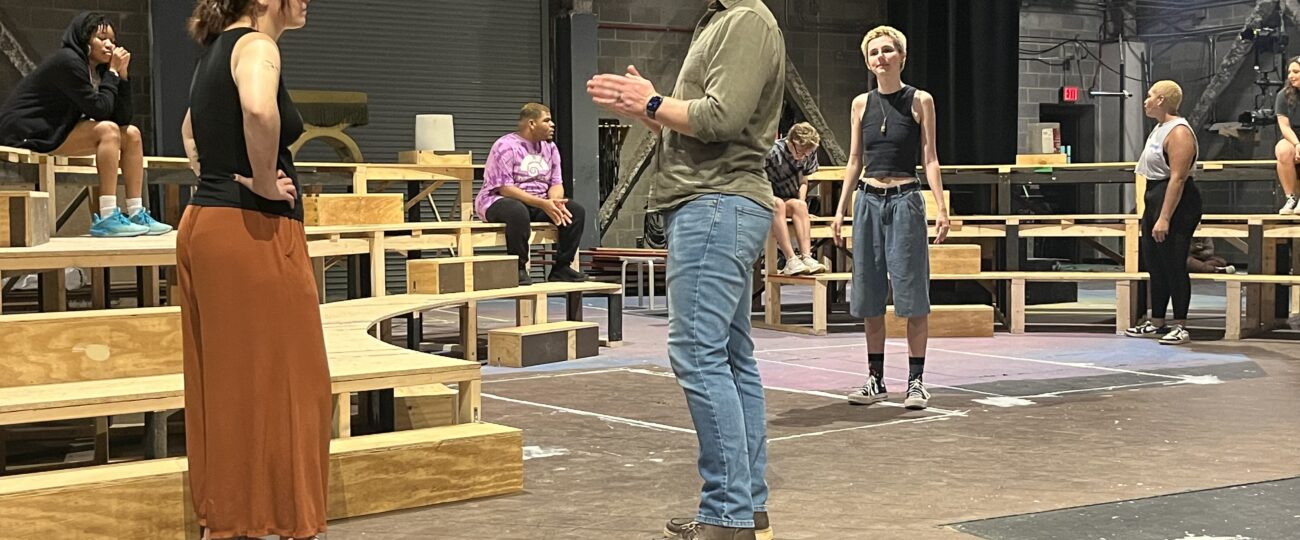Director Brandon Dawson sits down to discuss adapting the classic Greek tragedy that will be gracing Winthrop’s Johnson stage this spring.
The seventh piece in Winthrop University’s 2024-2025 performance cycle has recently begun rehearsals. “Antigone,” an Athenian tragedy by Sophocles, will be running performances from April 9 through 13 in Johnson Theatre.
While rehearsals begin, many aspects of the production will remain hidden until the curtains draw on opening night. However, director and Winthrop faculty Brandon Dawson was open to answering some questions around his vision for the production and the challenges that often arise along the way.
As a piece, “Antigone” can be particularly challenging to direct, especially because it is a part of a series. It is the third installment of the Oedipus Cycle: a series centered around the Greek character Oedipus and his rise and fall as the King of Thebes. Antigone, his daughter, is the titular character of the third work and thus experiences the actions of the play contextualized after the Oedipus works.
When asked about this challenge, Dawson said, “When we look at the whole War of the Roses cycle that Shakespeare dramatizes from Richard II thru Henry IV, V, & VI and ending with Richard III, he does a pretty good job of reminding the audience through the dialogue of where we came from in the previous play to get where we are now. With “Antigone”, Sophocles seems to be relying much more on the audience’s understanding of the mythology behind the play, so while there are references to the previous plays in the Theban Cycle, those references are not constant.”
Dawson continued, “For this production, our focus is primarily on the actions of the characters in the moment, regardless of the weight they bring with them from the previous plays. In this way, we aim to lay the consequences of each character’s actions at their own feet, rather than allowing the actions of characters in a previous play to be a potential scapegoat. That being said, it isn’t really possible to explore this play without the constant weight of Oedipus’ actions weighing upon the story. He is not present in this play, but for those audience members that are familiar with the Theban Cycle, they will surely sense that presence and catch the references to him in the dialogue of ‘Antigone’.”
‘Antigone’ is attributed to being written in 441 B.C and has existed in the literary realm as an extremely vital and popular piece of Greek literature. Similar to Shakespeare pieces, ‘Antigone’ requires special attention and care to ensure that the actors understand not just what they’re saying, but what those words express to an audience.
Previously, Dawson directed a production of “Romeo and Juliet” at Winthrop in the 2023-2024 academic year.
Evidently, he is no stranger to adapting older pieces with new aged casts.
When asked about how he approaches Grecian work in today’s world, Dawson said, “I will share with you the same thing I shared with the cast of both productions early on in the rehearsal process: the difference between classic and contemporary is explored in a classroom, but it has little to no bearing on our work in the rehearsal room. Meaning, the language that we get from Sophocles or Shakespeare or Shaw or Shephard all comes from the same place: truth. There are some structural differences in how the language should be approached, but at the end of the day, the characters written by any playwright are using language to pursue their desires. When we approach the script with that in mind, we find that the scripts written by Sophocles and Shakespeare are remarkably similar to how we express ourselves today.”
With a work as long standing as “Antigone”, one can’t help but wonder what inspired the Winthrop Department of Theatre and Dance to select such a work for their season. Winthrop as an institution is not unfamiliar with these types of pieces on their stages, but the student audience they’re performing for may be.
“The faculty of the Theatre & Dance department engages in a rigorous season selection process each year to determine the best shows for the student body we have. For this year, an Ancient Greek work fit the bill because it has been a while since the department has explored a work of this nature, and Antigone is a deeply relevant, accessible show for the students we have. Our goal is primarily to serve the education of the students in the shows we select, and it was the right time for Antigone to join the season,” Dawson said.
The Winthrop Department of Theatre and Dance evidently holds their students in mind when selecting exactly what pieces to perform. This year, “Antigone” fits the bill perfectly.
The themes presented and explored in the piece remain extremely relevant despite the piece’s age. “The works of the Ancient Greek playwrights have continued to remain relevant in a way that many plays have not. Yes, the Greek playwrights frequently wrote about the gods and rituals that we no longer incorporate into our everyday lives, but they also wrote deeply and critically on family, love, and the nature of power, morality, and responsibility. In Antigone, the characters spend the play exploring the extent of one person’s power and how it clashes with established norms and cultural expectations. Very timely, indeed.” Dawson said.
A lot of Greek plays hold many themes on humanity at their core, which is exactly what has kept them very integral to the theatrical and literary realm today. Many are even taught in South Carolina high schools today, including “Antigone.”
Besides directorial challenges, Dawson was also pleased to share some insight on the production, which included information about the text and visuals “Antigone” will hold in store for audiences.
“We are working from a version of the text that has been adapted by myself and our student Assistant Director, Jasmine Diaz. Our goal was to introduce more dialogue into a play that is full of one character speaking while everyone else listens. For those that are familiar with the play, that may be the most immediately identifiable difference in terms of the language,” Dawson said.
“As for the appearance of the play, our team of designers has been working from Classic Greek art, architecture, and clothing as their inspiration for their work, but we are readily moving beyond that so we are not tied down to the ritual and rigidity of the traditional “Greek look.” There will be combat with spears and swords, aggressive and heightened physicality from the Chorus, and powerful language that drives towards the inevitable end of the play. ‘Antigone’ provides an opportunity to explore the bounds of one person’s power when that power is set against the institutions they are sworn to defend. The Chorus reminds us that the challenges faced in the play are the same challenges we still face today.”





Very cool! Author has a wonderful style.